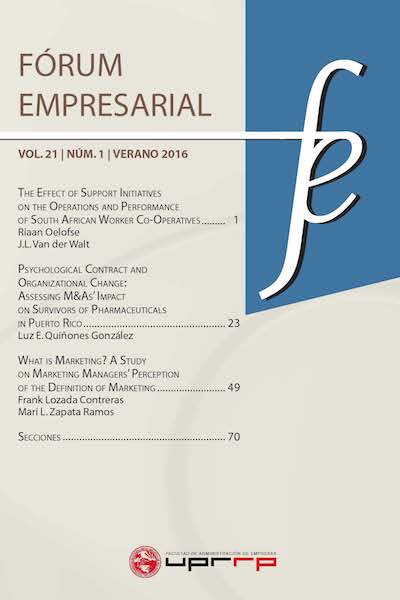Resumen
Este estudio de 111 cooperativas de trabajadores registradas como clientes en la Small Enterprise Development Agency representa una investigación de la contribución del apoyo del gobierno al rendimiento empresarial y las operaciones de estas entidades. Se evaluó un grupo relativamente exitoso versus las que no tuvieron éxito, para determinar si había alguna diferencia en el apoyo que recibieron los grupos concernidos. Además, se evaluaron el rendimiento, las operaciones y la gestión de las cooperativas apoyadas versus las que no lo fueron, para determinar si la ayuda había hecho una diferencia. Los resultados revelan un efecto mínimo en las operaciones y el rendimiento de las cooperativas. Se hacen recomendaciones para el desarrollo futuro.
Citas
Brazda, J., & Schediwy, R. (2001). Preconditions for successful cooperative ventures in the light of historical evidence. Review of International Co-operation, 94(1), 35-42.
Chakela, T. (2012). The performance of cooperatives in Mantsopa municipal area (Unpublished master‘s thesis). University of the Free State, Bloemfontein, South Africa.
Companies and Intellectual Property Commission. (2013). Statistics of co-operatives in the Republic of South Africa: 2009 to 2012, Vol¬ume 4. Retrieved from http://www.cipc.co.za/index.php/manage-your-business/manage-your-cooper/changing-status-your-company/division-co-operative/
Chamard, J., & Webb, T. (2006). Editors notes. In J. Chamard & T. Webb (Eds.), [Accounting for cooperatives] (pp. 3-15). Symposium conducted at Saint Mary‘s University, Halifax, Canada.
Chibanda, M., Ortmann, G. F., & Lyne, M. C. (2009). Institutional and governance factors influencing the performance of selected smallholder agricultural cooperatives in KwaZulu-Natal. Agrekon, 48(3), 293-306.
Cohen, J. (1988). Statistical power analysis for the behavioural sciences (2nd ed.). Hillsdale, NJ: Erlbaum.
Cornforth, C., Thomas, H., Lewis, J., & Spear, R. (1988). Developing successful worker co-operatives. London, England: Sage Publications.
Dash, A. (2013). Building smart cooperatives for the 21st century. In B. Roelants (Ed.), Cooperative growth in the 21st century (pp. 41-47). Brussels, Belgium: International Cooperative Alliance.
Department of Trade and Industry. (2004). A cooperative development policy for South Africa. Retrieved from http://www.dedea.gov.za/Economic%20Development%20Legislation/Cooperatives%20Development%20Policy%20of%20SA%202004.pdf
Department of Trade and Industry. (2010). Briefing on the development and support programmes for co-operatives: Empowerment and Enterprise Development Division (EEDD). Retrieved from http://pmg-assets.s3-website-eu-west-1.amazonaws.com/docs/100825dti-edit.pdf
Develtere, P., Pollet, I., & Wanyama, F. (Eds.). (2008). Cooperating out of poverty: The renaissance of the African co-operative movement. Retrieved from http://labordoc.ilo.org/record/412725
Dvir, D., Sadeh, A., & Malach-Pines, A. (2010). The fit between entrepreneurs‘ personalities and the profile of the ventures they manage and business success: An exploratory study. Journal of High Technology Management Research, 21, 43-51.
Fairbairn, B. (2002). How "social" are coops? Tensions, transitions, and the social economy of co-operatives in Canada. Économie et Solidarités, 33(1), 112-130.
Haber, S., & Reichel, A. (2007). The cumulative nature of the entrepreneurial process: The contribution of human capital, planning and environment resources to small venture performance. Journal of Business Venturing, 22, 119-145.
Harms, B. (2012). The role of co-operatives in enterprise and SMME development (local economic development). Retrieved from http://www.dgrvsa.co.za/Publications/SMMETshwane.pdf.
Hough, P., Wilson, D., & Corcoran, H. (2010). The worker co-op sector in Canada: Success factors, and planning for growth. Retrieved from http://www.canadianworker.coop/sites/canadianworker.coop/files/CWCF_Canadian_SSHRC_Pa¬per_16-6-2010_fnl.pdf.
International Co-operative Alliance. (2010). Co-operative identity, values and principles. Retrieved from http://ica.coop/en/what-co-op/co-operative-identity-values-principles.
International Co-operative Alliance. (2012). Statistical information on the co-operative movement. Retrieved from http://www.ica.coop/ coop/statistics.html.
Machaba, M. (2012). Statistical report: South African National Apex Co-operative (SANACO). Pretoria, South Africa.
Mqingwana, C. B. (2010). The role of co-operatives in the socio-economic development of Dutywa villages, Port Elizabeth (Unpublished master‘s thesis). Nelson Mandela Metropolitan University, Port Elizabeth, South Africa.
Philip, K. (2003). Co-operatives in South Africa: Their role in job creation and poverty reduction. Retrieved from http://www.dgrvsa.co.za/Publications/safoundation.pdf
Redrebel Productions. (Ed). (2009). The DTI baseline study of co-operatives in South Africa. Pretoria, South Africa: Department of Trade and Industry.
Ressel, A. (2014). Let‘s stop throwing stones in the well. Retrieved from http://www.bizcommunity.com/Article/196/626/118427.html#more
Satgar, V. (2007). The state of the South African cooperative sector. Retrieved from http://www.copac.org.za/files/State%20of%20Coop%20Sector.pdf
Satgar, V., & Williams, M. (2011). The worker co-operative alternative in South Africa. In J. Daniel, P. Naidoo, D. Pillay, & R. Southall (Eds.), New South African Review 2 (pp. 202-220). Johannesburg, South Africa: Wits University Press.
Simpson, M., Tuck, N., & Bellamy, S. (2004). Small business success factors: The role of education and training. Education + Training, 46(8), 481-491.
Skibbens, R., & Chamard, J. (2006). If you don‘t measure it, you can‘t manage it! In J. Chamard & T. Webb (Eds.), [Accounting for co-operatives] (pp. 36-45). Symposium conducted at Saint Mary‘s University, Halifax, Canada.
Statistics South Africa. (2012). Statistical release P0441: Gross domestic product: Second quarter 2011. Retrieved from http://www.statssa.gov. za/publications/P0441/P04412ndQuarter2011.pdf
Steyn, H. S. (2009). Manual for the determination of effect size indices and practical significance (2nd ed.). Retrieved from http://v-drpl-lnx2.nwu.ac.za/content/nwu-potchefstroom-campus-faculty-natural-sciences-statistical-consultation-service-10
Theron, J. (2008). The co-operative tradition in South Africa and Namibia: Essential research for a co-operative facility. In P. Develtere, I. Pollet, & F. Wanyama (Eds.), Cooperating out of poverty: The renaissance of the African co-operative movement. Retrieved from http://labordoc.ilo.org/record/412725
Timmons, J. A. (1999). New venture creation: Entrepreneurship for the 21st century (5th ed.). Boston, MA: Irwin/McGraw-Hill.
Wessels, J. (2014). Presentation on the 1st report on co-operatives in the Free State province (Unpublished manuscript). University of the Free State, [Bloemfontein,] South Africa.

Esta obra está bajo una licencia internacional Creative Commons Atribución-NoComercial-CompartirIgual 4.0.
Derechos de autor 2016 Fórum Empresarial

